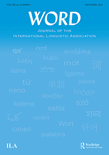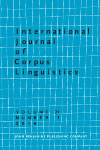
Lingua Italiana
Scope & Guideline
Unveiling the Nuances of Italian Language and Culture
Introduction
Aims and Scopes
- Historical Linguistics:
The journal emphasizes research on the evolution of the Italian language, exploring linguistic changes over time, including the analysis of historical texts and dialects. - Sociolinguistics and Dialectology:
There is a consistent focus on the social aspects of language use, including the study of dialects and their roles within different communities, particularly in the context of Italy's diverse linguistic landscape. - Textual Analysis:
A significant area of research involves the textual analysis of Italian literature and legal texts, examining linguistic features, stylistic choices, and their implications for understanding cultural and historical contexts. - Teaching and Pedagogy:
The journal also addresses the teaching of Italian as a first language, contributing to discussions on pedagogical approaches and methodologies in language education. - Pragmatics and Discourse Analysis:
Research on pragmatics and discourse markers is prevalent, focusing on how language functions in communication, particularly in specific genres such as theatre and legal texts.
Trending and Emerging
- Contemporary Linguistic Practices:
There is a growing trend towards examining contemporary language usage, including the evolution of Italian in modern contexts, which reflects changes in society and technology. - Interdisciplinary Approaches:
Research that intersects with other fields such as sociology, law, and education is on the rise, indicating a trend towards broader contextual analyses of language. - Linguistic Features in Literature and Theatre:
The analysis of linguistic features in literary and theatrical texts is increasingly prominent, with a focus on how language shapes narrative and performance in historical and contemporary works. - Language and Identity:
Emerging themes include the exploration of language as a marker of identity, particularly in the context of regional dialects and their socio-cultural significance in Italy.
Declining or Waning
- Traditional Rhetoric and Poetics:
Research exploring traditional rhetorical devices and poetics, while still present, has become less prominent, as scholars increasingly turn their attention to contemporary linguistic practices and theories. - Historical Syntax:
Although historical syntax was once a significant focus, there appears to be a waning interest in this area, with fewer studies dedicated to the syntactical structures of earlier forms of Italian. - Etymology Studies:
While etymological research continues, the frequency of publications specifically centered on etymological analysis of Italian words seems to be decreasing, possibly due to a shift towards more applied linguistic studies.
Similar Journals

Dacoromania
Bridging ideas and cultures through language and literature.Dacoromania, published by the esteemed EDITURA ACAD ROMANE, is an Open Access academic journal that has been contributing to the fields of Linguistics, Language, Literature, and Literary Theory since 2011. With a mission to foster scholarly dialogue and facilitate knowledge dissemination, the journal enables researchers, professionals, and students to access a wealth of innovative research and critical scholarship without barriers. Although currently classified in the Q4 quartile for its categories in Linguistics and Literature, Dacoromania aspires to enhance its visibility and impact within these disciplines, providing a platform for emerging voices and ideas from Romania and beyond. The journal is openly accessible and invites submissions that push the boundaries of linguistic and literary studies, ensuring a vibrant exchange of thought in a rapidly evolving academic landscape.

Linguas e Instrumentos Linguisticos
Pioneering Insights into Language ApplicationsLinguas e Instrumentos Linguisticos is a premier academic journal dedicated to the exploration and analysis of language and linguistic tools, published by RG EDITORA in collaboration with Universidade Estadual de Campinas (UNICAMP). With a focus on enhancing the understanding of linguistic structures and applications, this journal serves as a vital resource for researchers, professionals, and students interested in the dynamics of language within various contexts. Although currently not open access, it offers a wide array of scholarly articles that delve into innovative methodologies, theoretical frameworks, and empirical studies in linguistics. Operating out of São Paulo, Brazil, Linguas e Instrumentos Linguisticos fosters a rich academic dialogue and is committed to advancing the field of linguistic research, making it an essential read for anyone engaged in linguistic studies.

Yuyan Kexue-Linguistic Sciences
Bridging Theoretical and Applied Linguistics for Global ImpactYuyan Kexue-Linguistic Sciences, published by SCIENCE PRESS, is a pivotal academic journal dedicated to the field of linguistics. With its ISSN of 1671-9484, this journal seeks to explore and illuminate various linguistic phenomena, contributing significantly to the understanding of language in both theoretical and applied contexts. Emphasizing interdisciplinary research, it welcomes contributions that bridge linguistics with areas such as cognitive science, sociology, and communication studies. Although it currently does not offer open access, Yuyan Kexue-Linguistic Sciences aims to provide a platform for researchers, professionals, and students alike to engage with cutting-edge studies and emerging trends in linguistics. Its publication location in Beijing positions it as a vital contributor to the global discourse in the linguistic sciences, catering to both a national and international audience. As the journal continues to grow, it aspires to maintain high academic standards and foster scholarly exchange for years to come.

Sprache & Sprachen
Connecting Scholars Through Language ResearchSprache & Sprachen is a renowned academic journal published by the Gesellschaft Sprache & Sprachen Gesus EV, focusing on the dynamic field of linguistics and language studies. With an ISSN of 0934-6813 and an E-ISSN of 2199-6016, this journal serves as a valuable platform for researchers and scholars to share innovative research, theoretical frameworks, and empirical studies related to language usage, structure, and evolution. Though it currently does not operate under an Open Access model, it maintains a robust reputation within the academic community, contributing significantly to ongoing discussions in linguistics. The journal's objective is to foster interdisciplinary collaboration and provide a forum for diverse linguistic perspectives, making it an essential resource for professionals and students alike who are keen on advancing their understanding of language phenomena. Located in Wuppertal, Germany, Sprache & Sprachen aims to engage the global academic audience by disseminating critical insights and encouraging scholarly discourse.

LINGUA E STILE
Engaging with Contemporary Debates in Linguistic TheoryLINGUA E STILE, published by SOC ED IL MULINO, is a distinguished academic journal based in Italy that delves into the intricate realms of linguistics, literature, and philosophy. With an ISSN of 0024-385X, this journal has been a vital platform for scholarly discourse since its inception, covering a broad spectrum of topics from linguistic theory to literary analysis. Although it currently holds a Q4 category ranking in 2023 across multiple disciplines—specifically in Linguistics and Language, Literature and Literary Theory, and Philosophy—it remains committed to fostering insightful contributions that challenge and expand conventional understanding in these fields. While it does not offer open access, the journal diligently focuses on publishing high-quality research that appeals to academics, professionals, and students alike. With the convergence of multi-disciplinary approaches, LINGUA E STILE is positioned to engage with contemporary debates and developments, enriching the academic landscape from its base in Bologna, Italy, and inviting contributions that exemplify the evolving intersections of language and thought.

WORD-JOURNAL OF THE INTERNATIONAL LINGUISTIC ASSOCIATION
Fostering impactful discussions in the realm of linguistics.WORD-JOURNAL OF THE INTERNATIONAL LINGUISTIC ASSOCIATION is a leading peer-reviewed journal dedicated to advancing the field of linguistics and language studies. Published by Routledge Journals, Taylor & Francis Ltd, this esteemed journal has earned a reputation for its rigorous scholarship, reflected in its 2023 Q2 ranking in Linguistics and Language and its solid performance in Scopus Ranks. Encompassing a wide range of topics—from theoretical frameworks to empirical research—WORD serves as an essential resource for linguistics researchers, educators, and students alike. While currently not operating under an open access model, the journal is committed to providing high-quality, impactful research articles that contribute significantly to the linguistic community. With its convergence periods from 1998 to 2009 and 2015 to 2024, WORD continuously fosters the discourse of language studies, ensuring that critical insights and discussions are accessible for ongoing academic exploration.

REVUE DE LINGUISTIQUE ROMANE
Celebrating the Legacy of Romance LanguagesREVUE DE LINGUISTIQUE ROMANE, published by the esteemed SOCIÉTÉ LINGUISTIQUE ROMANE, is a prominent academic journal dedicated to the exploration of Romance linguistics. With its ISSN 0035-1458, the journal plays a significant role in advancing knowledge within the fields of linguistics and the history and philosophy of science. Although it does not currently offer Open Access, it provides critical insights and peer-reviewed research that are indispensable for scholars, educators, and students interested in the nuances of Romance languages. The journal, which has seen converged coverage from 2006 to 2017, and then again from 2019 to 2021, is ranked in the third quartile (Q3) across various categories within Scopus, reflecting its established presence in the academic community. As a vital resource for interdisciplinary studies, REVUE DE LINGUISTIQUE ROMANE is instrumental for those seeking to deepen their understanding of linguistic structures, cultural nuances, and the historical development of Romance languages.

Verba-Anuario Galego de Filoloxia
Fostering Innovative Research in Language and PhilologyVerba-Anuario Galego de Filoloxia is a prominent academic journal published by UNIV SANTIAGO COMPOSTELA, dedicated to advancing the field of linguistics and language studies. Hailing from Spain, this journal provides a vital platform for researchers, educators, and students interested in Galician philology and its broader linguistic implications. Although it operates under traditional access models, the journal’s commitment to quality research is reflected in its categorization within Q3 in Linguistics and Language for 2023, showcasing its significant contributions to the field. Encompassing a convergence period from 2017 to 2024, Verba garners attention in both the Arts and Humanities and Social Sciences domains, with its Scopus rankings highlighting its moderate impact within these categories. By nurturing scholarly dialogue and disseminating innovative studies, Verba-Anuario Galego de Filoloxia plays a crucial role in promoting linguistic research, making it an essential resource for professionals and academic institutions striving to explore the complexities of language and philology.

Turkic Languages
Illuminating the Cultural Contexts of Turkic LanguagesTurkic Languages is an esteemed academic journal published by HARRASSOWITZ VERLAG, dedicated to the exploration and analysis of Turkic languages within the broader fields of linguistics and language studies. With an ISSN of 1431-4983, this journal serves as a vital platform for researchers, professionals, and students interested in the intricate structures, dynamics, and cultural contexts of Turkic languages. Although it currently operates without an Open Access option, the journal's commitment to quality research is evident in its placement within the Q4 category of Linguistics and Language for 2023, alongside its Scopus rankings where it stands in the 30th and 26th percentiles for Language and Linguistics across Arts and Humanities and Social Sciences, respectively. The journal's scope encompasses a variety of linguistic phenomena, striving to foster a deeper understanding of Turkic languages and their significance in the global linguistic landscape. With converged years from 2017 to 2022, Turkic Languages continues to uphold its reputation as a crucial resource for advancing scholarship in this specialized field.

International Journal of Corpus Linguistics
Exploring Linguistic Patterns with PrecisionThe International Journal of Corpus Linguistics, published by John Benjamins Publishing Co, is a premier academic journal dedicated to advancing the field of corpus linguistics. With an ISSN of 1384-6655 and an E-ISSN of 1569-9811, this journal serves as a pivotal platform for researchers and practitioners alike to explore the intricate relationships between language and corpora. Housed in the Netherlands and operating within the prestigious Q1 category in Linguistics and Language, the journal boasts impressive Scopus rankings, positioning it in the top percentiles of both Arts and Humanities and Social Sciences. Its commitment to rigorous peer-reviewed scholarship not only enhances understanding in the domain but also fosters collaboration among scholars. With coverage spanning from 1996 to 2024, the journal publishes cutting-edge research that contributes valuable insights into linguistic patterns and empirical studies. Whether you're an established researcher or a student embarking on your academic journey, the International Journal of Corpus Linguistics is an essential resource for anyone seeking to deepen their understanding of language through corpora.